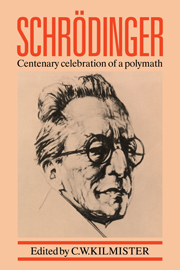Book contents
- Frontmatter
- Contents
- List of contributors
- Preface
- 1 Introduction
- 2 Boltzmann's influence on Schrödinger
- 3 Schrödinger's original interpretation of the Schrödinger equation: a rescue attempt
- 4 Are there quantum jumps?
- 5 Square root of minus one, complex phases and Erwin Schrödinger
- 6 Consequences of the Schrödinger equation for atomic and molecular physics
- 7 Molecular dynamics: from H+H2 to biomolecules
- 8 Orbital presentation of chemical reactions
- 9 Quantum chemistry
- 10 Eamon de Valera, Erwin Schrödinger and the Dublin Institute
- 11 Do bosons condense?
- 12 Schrödinger's nonlinear optics
- 13 Schrödinger's unified field theory seen 40 years later
- 14 The Schrödinger equation of the Universe
- 15 Overview of particle physics
- 16 Gauge fields, topological defects and cosmology
- 17 Quantum theory and astronomy
- 18 Schrödinger's contributions to chemistry and biology
- 19 Erwin Schrödinger's What is Life? and molecular biology
- Index
5 - Square root of minus one, complex phases and Erwin Schrödinger
Published online by Cambridge University Press: 19 January 2010
- Frontmatter
- Contents
- List of contributors
- Preface
- 1 Introduction
- 2 Boltzmann's influence on Schrödinger
- 3 Schrödinger's original interpretation of the Schrödinger equation: a rescue attempt
- 4 Are there quantum jumps?
- 5 Square root of minus one, complex phases and Erwin Schrödinger
- 6 Consequences of the Schrödinger equation for atomic and molecular physics
- 7 Molecular dynamics: from H+H2 to biomolecules
- 8 Orbital presentation of chemical reactions
- 9 Quantum chemistry
- 10 Eamon de Valera, Erwin Schrödinger and the Dublin Institute
- 11 Do bosons condense?
- 12 Schrödinger's nonlinear optics
- 13 Schrödinger's unified field theory seen 40 years later
- 14 The Schrödinger equation of the Universe
- 15 Overview of particle physics
- 16 Gauge fields, topological defects and cosmology
- 17 Quantum theory and astronomy
- 18 Schrödinger's contributions to chemistry and biology
- 19 Erwin Schrödinger's What is Life? and molecular biology
- Index
Summary
Introduction
In a lecture in April 1970 Dirac talked about the early days of quantum mechanics (Dirac, 1972). Among other topics he discussed noncommutative algebra, and added
The question arises whether the noncommutation is really the main new idea of quantum mechanics. Previously I always thought it was but recently I have begun to doubt it and to think that maybe from the physical point of view, the noncommutation is not the only important idea and there is perhaps some deeper idea, some deeper change in our ordinary concepts which is brought about by quantum mechanics.
He then expanded on this subject and concluded
So if one asks what is the main feature of quantum mechanics, I feel inclined now to say that it is not noncommutative algebra. It is the existence of probability amplitudes which underlie all atomic processes. Now a probability amplitude is related to experiment but only partially. The square of its modulus is something that we can observe. That is the probability which the experimental people get. But besides that there is a phase, a number of modulus unity which can modify without affecting the square of the modulus. And this phase is all important because it is the source of all interference phenomena but its physical significance is obscure. […]
- Type
- Chapter
- Information
- SchrödingerCentenary Celebration of a Polymath, pp. 53 - 64Publisher: Cambridge University PressPrint publication year: 1987
- 20
- Cited by



